Charles E W Bean, Diaries, AWM38 3DRL 606/251/1 - 1915 - 1936 - Part 7
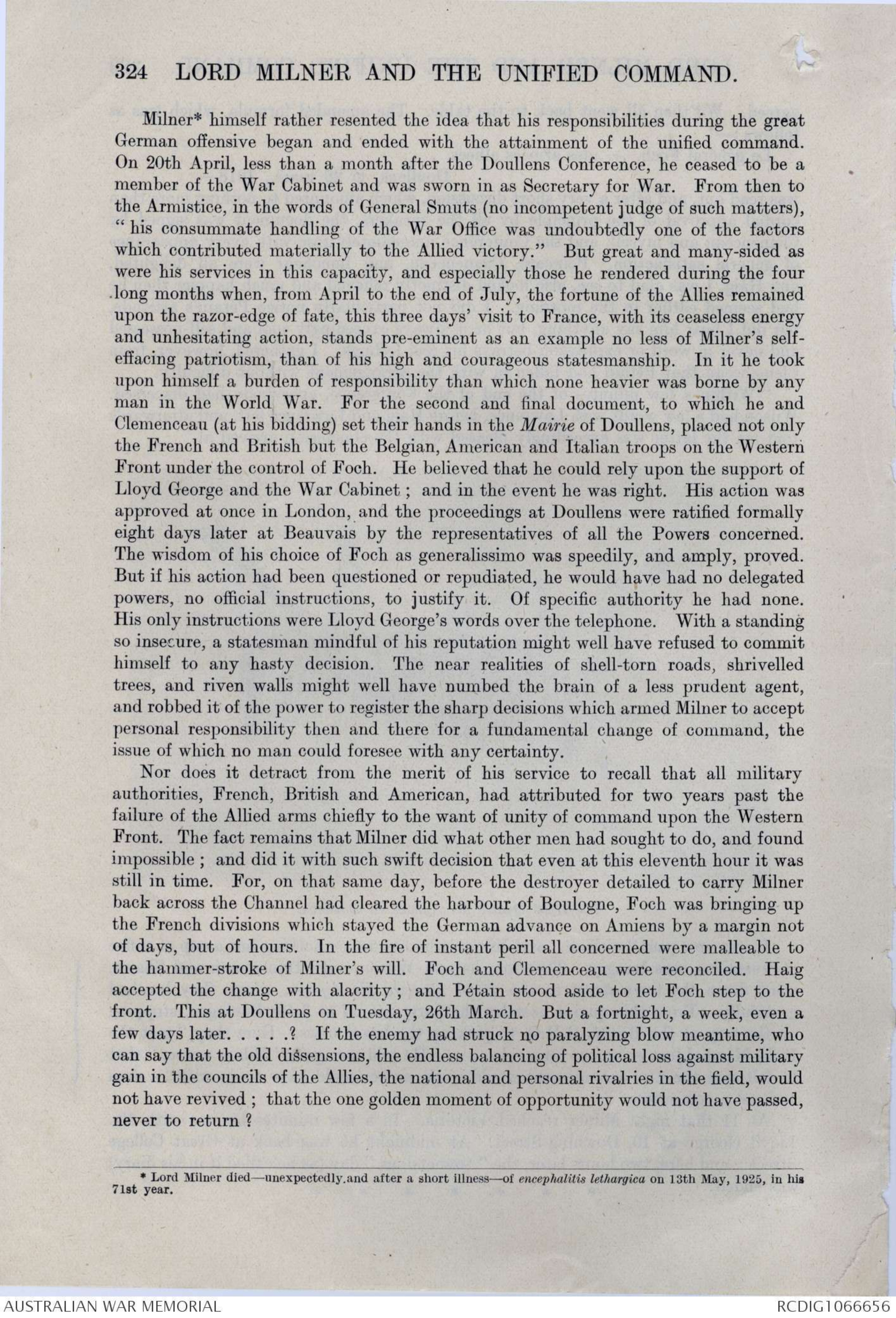
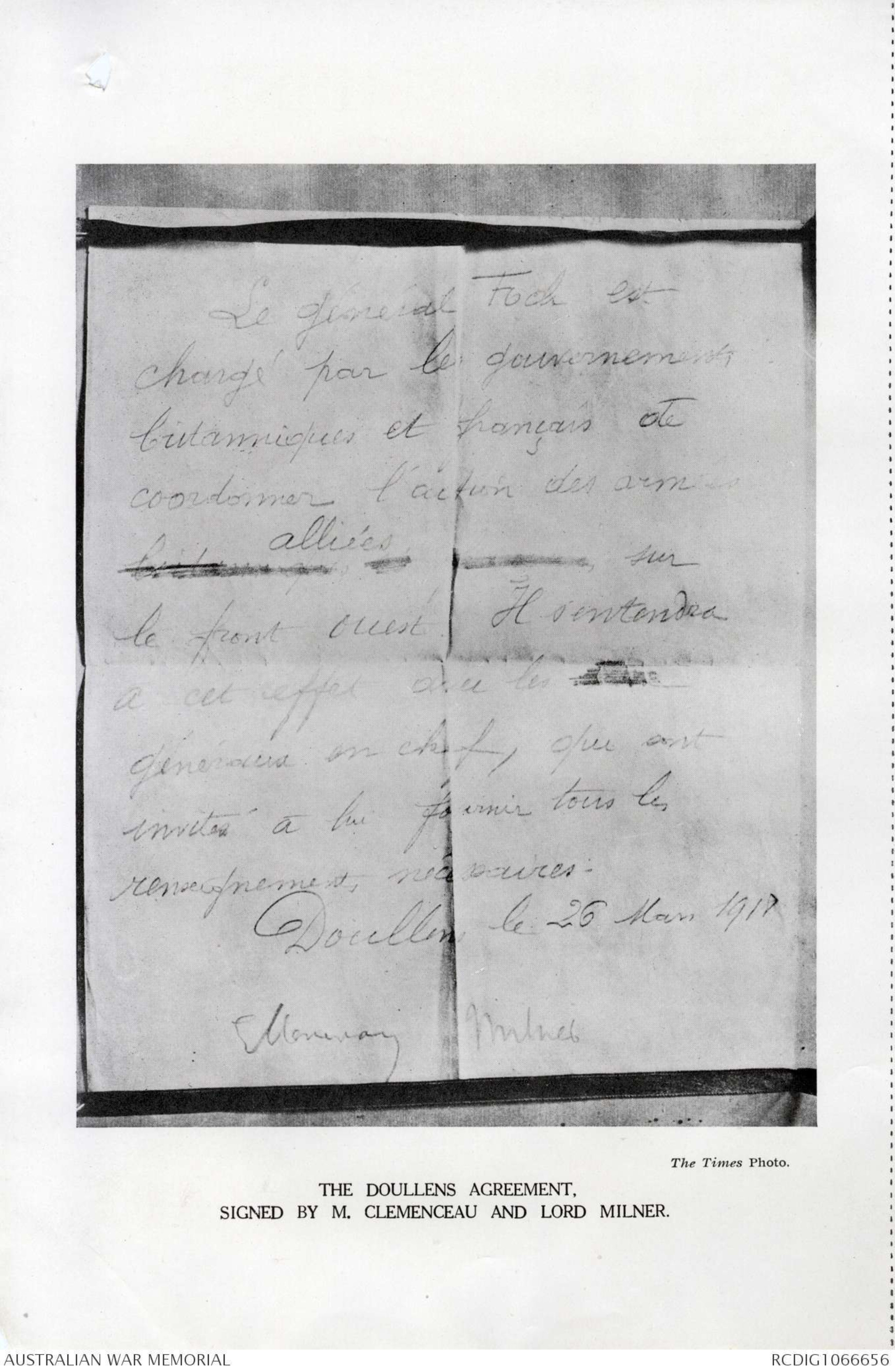
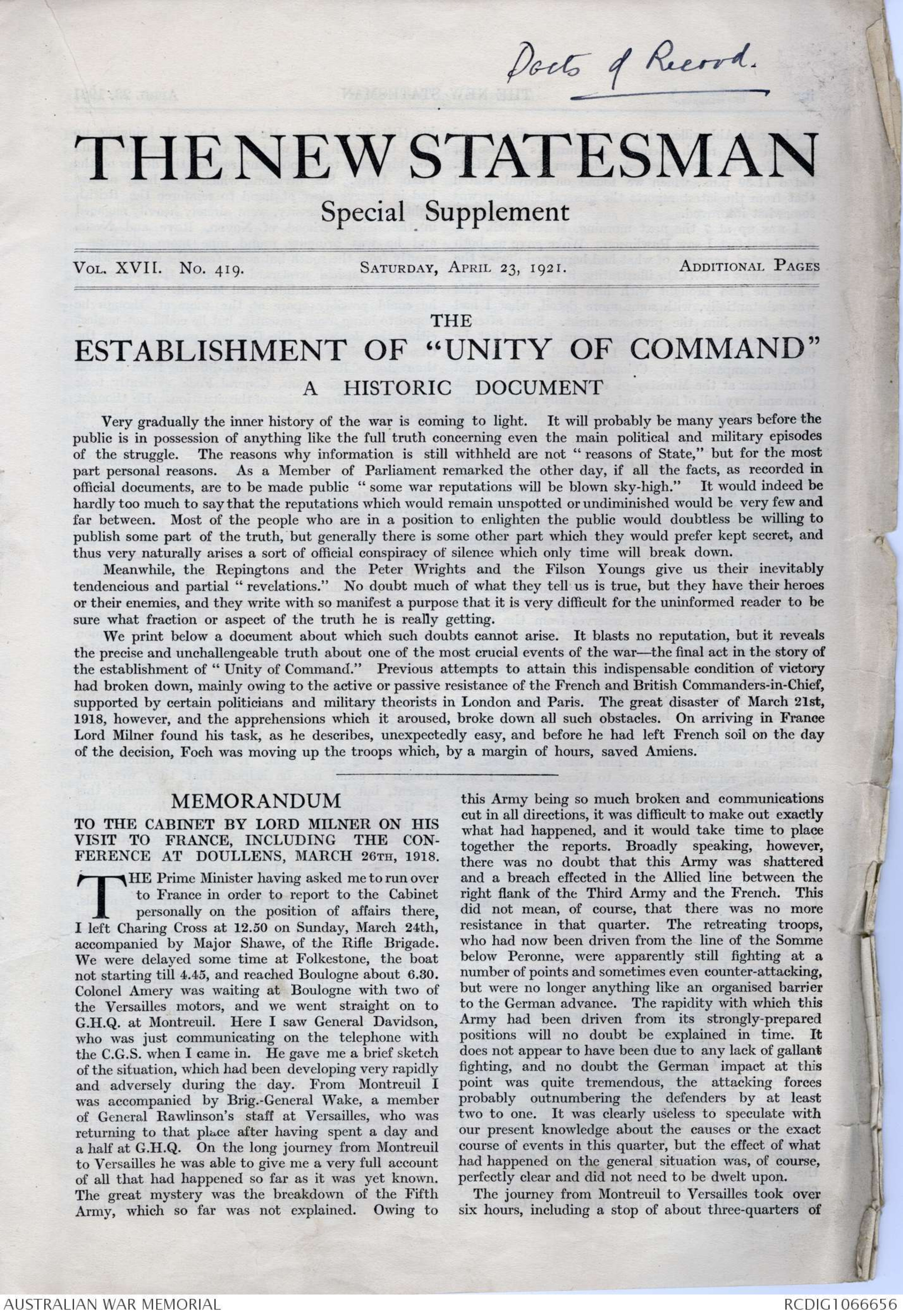
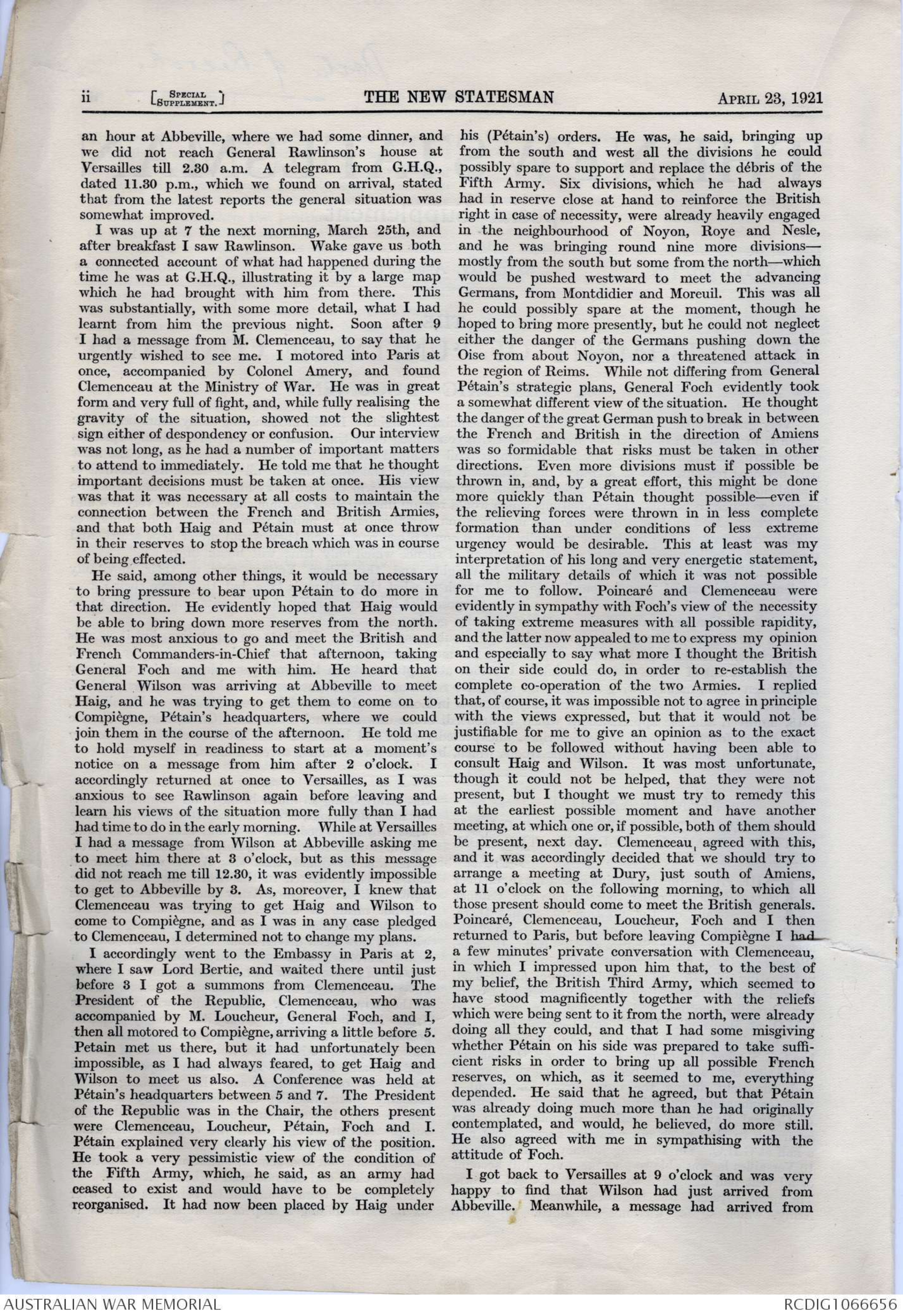
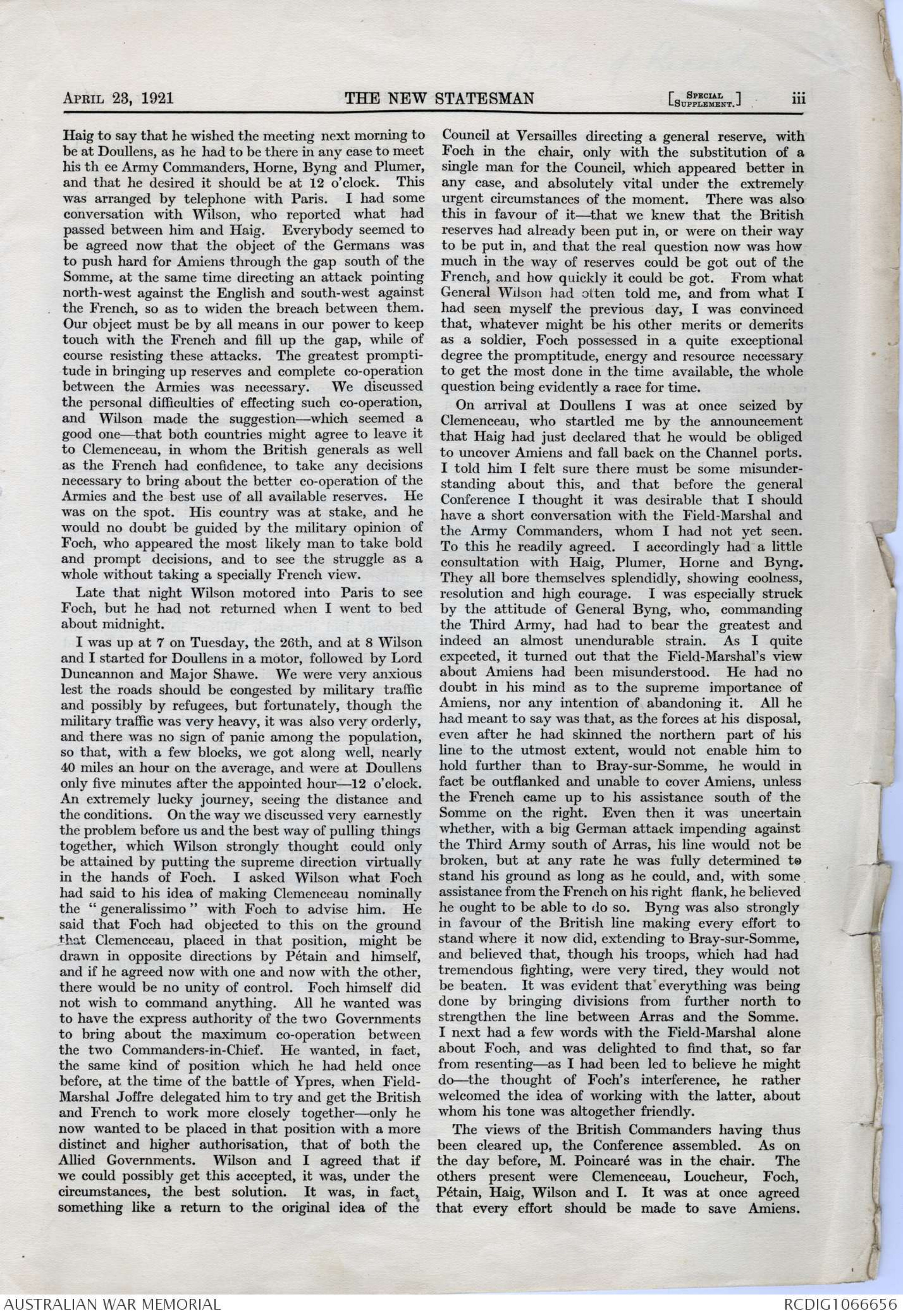
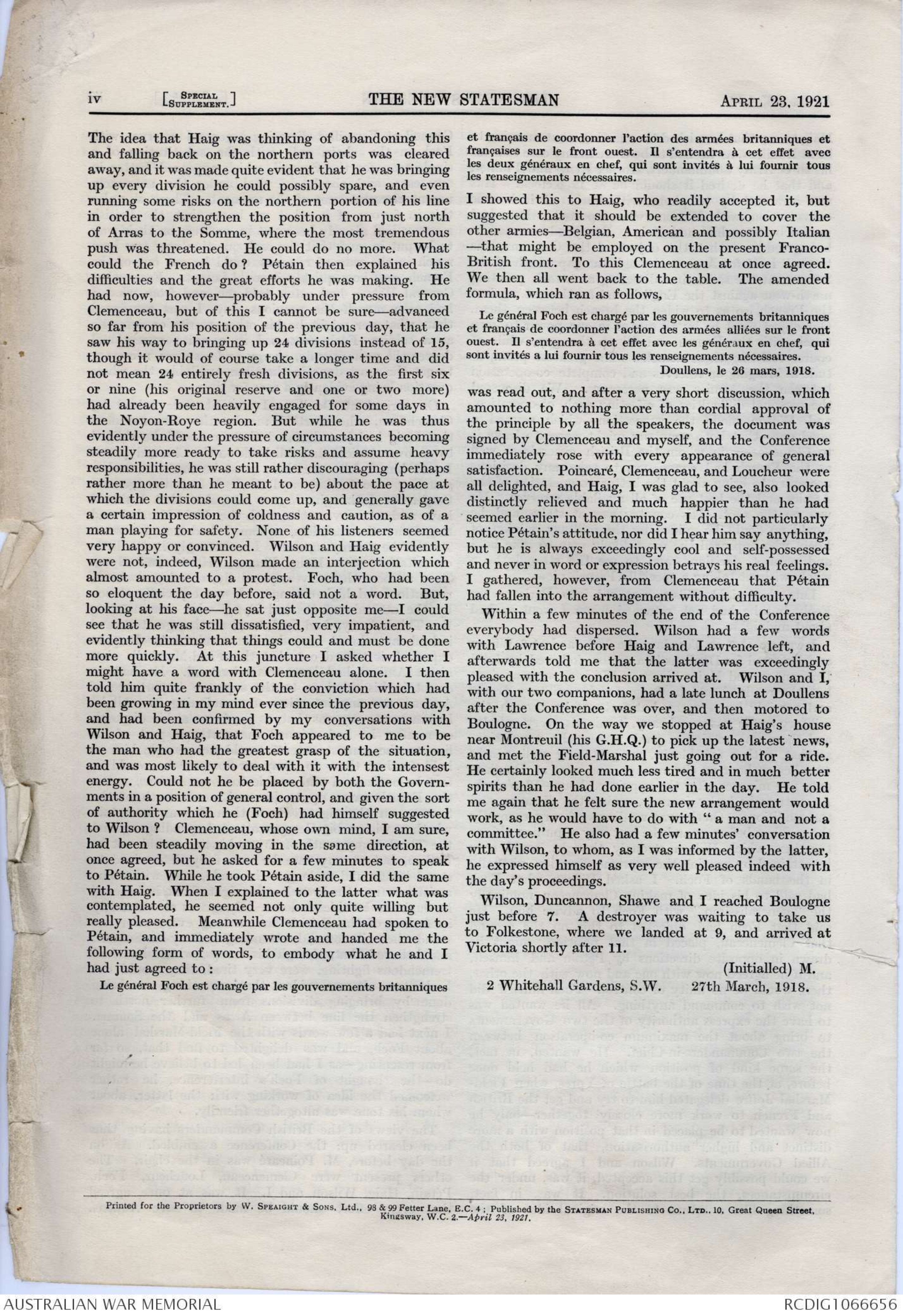
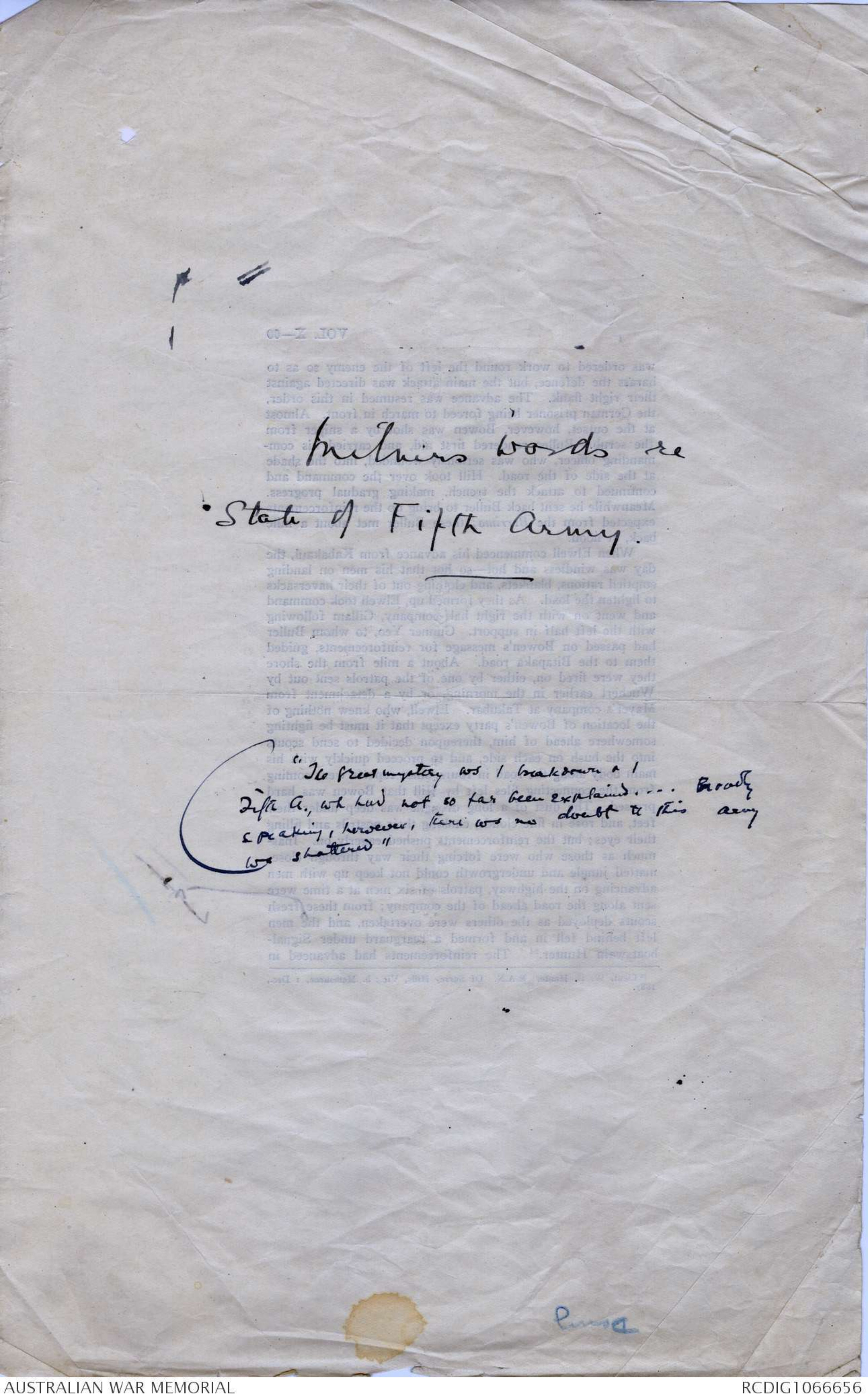
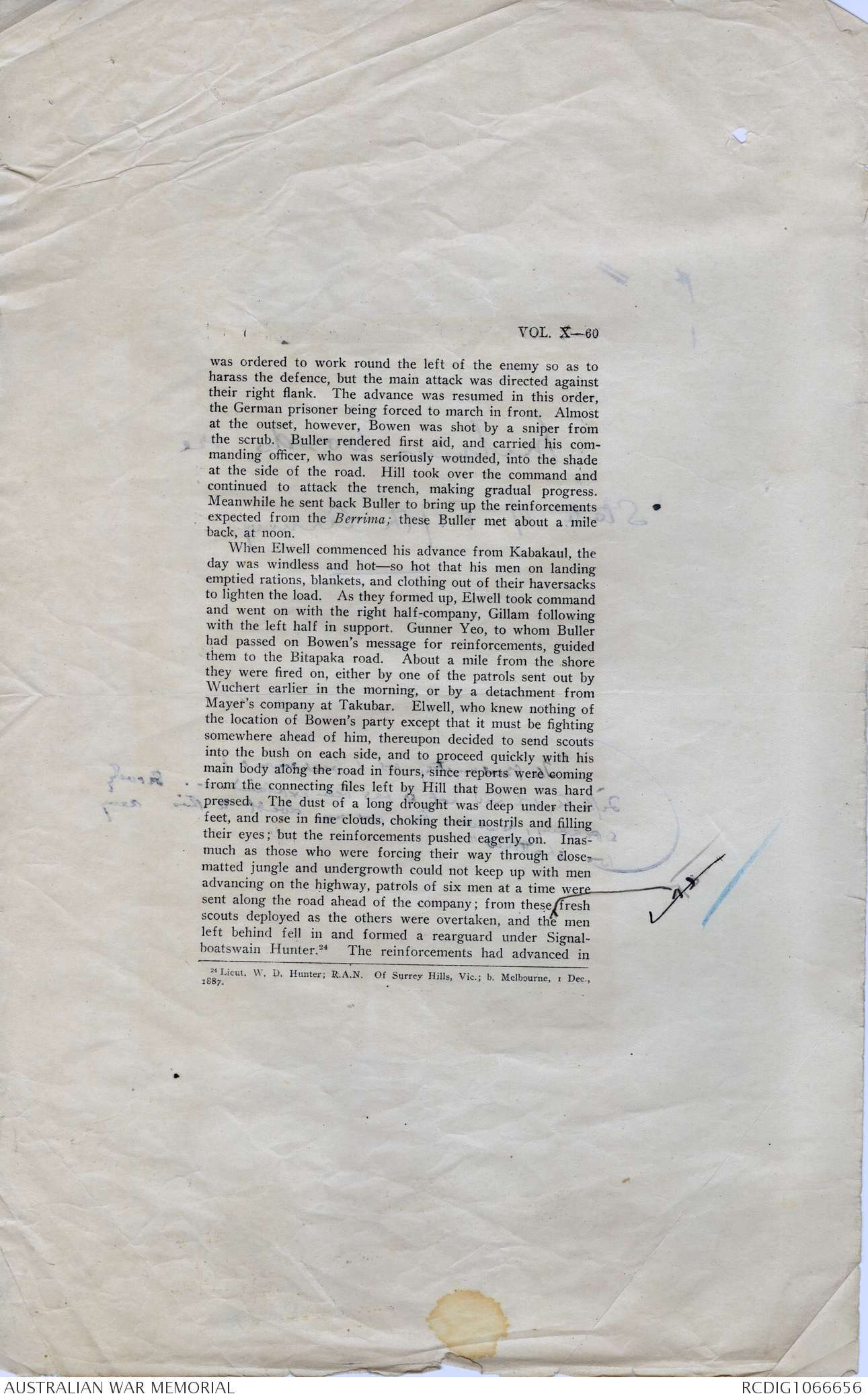
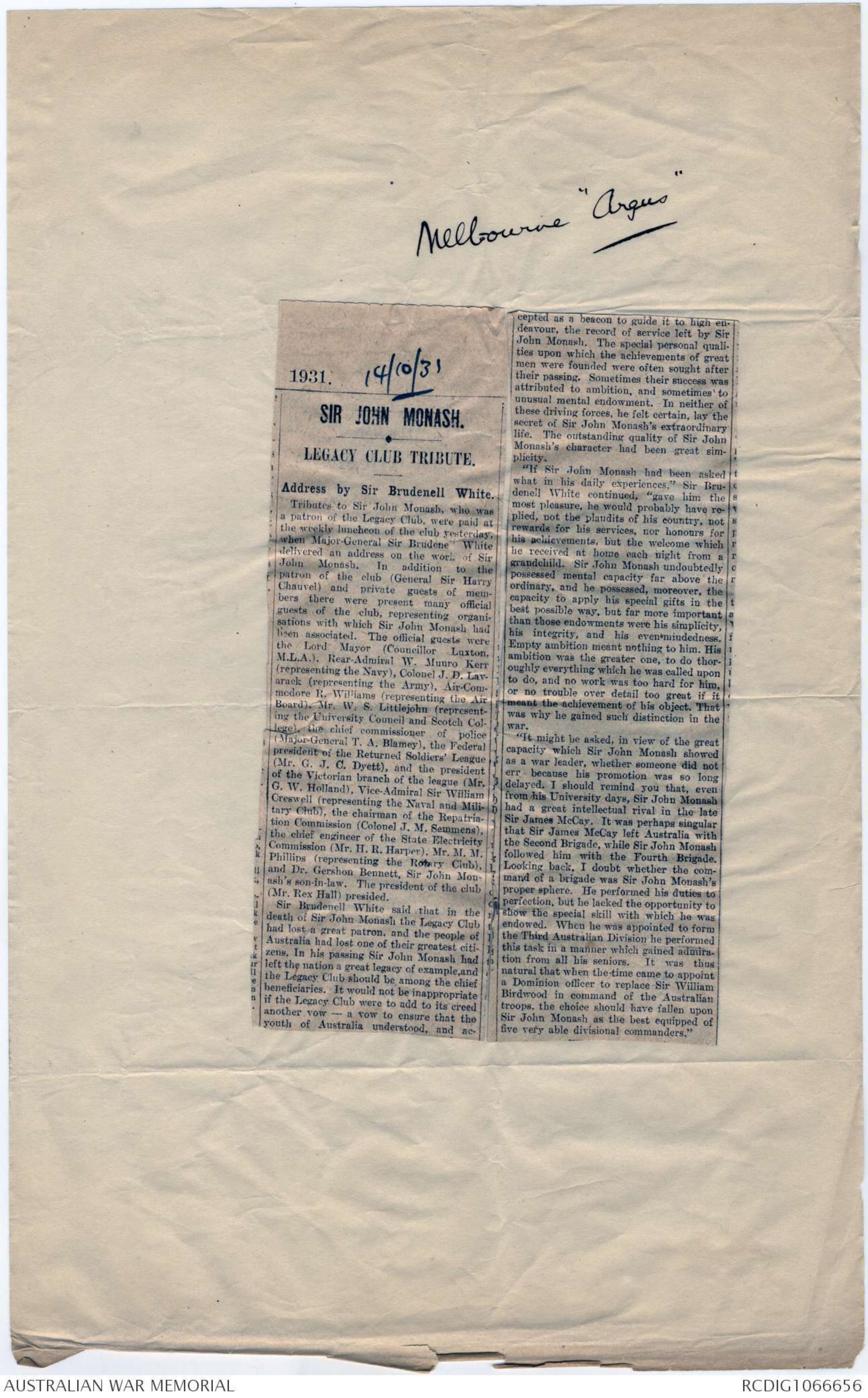
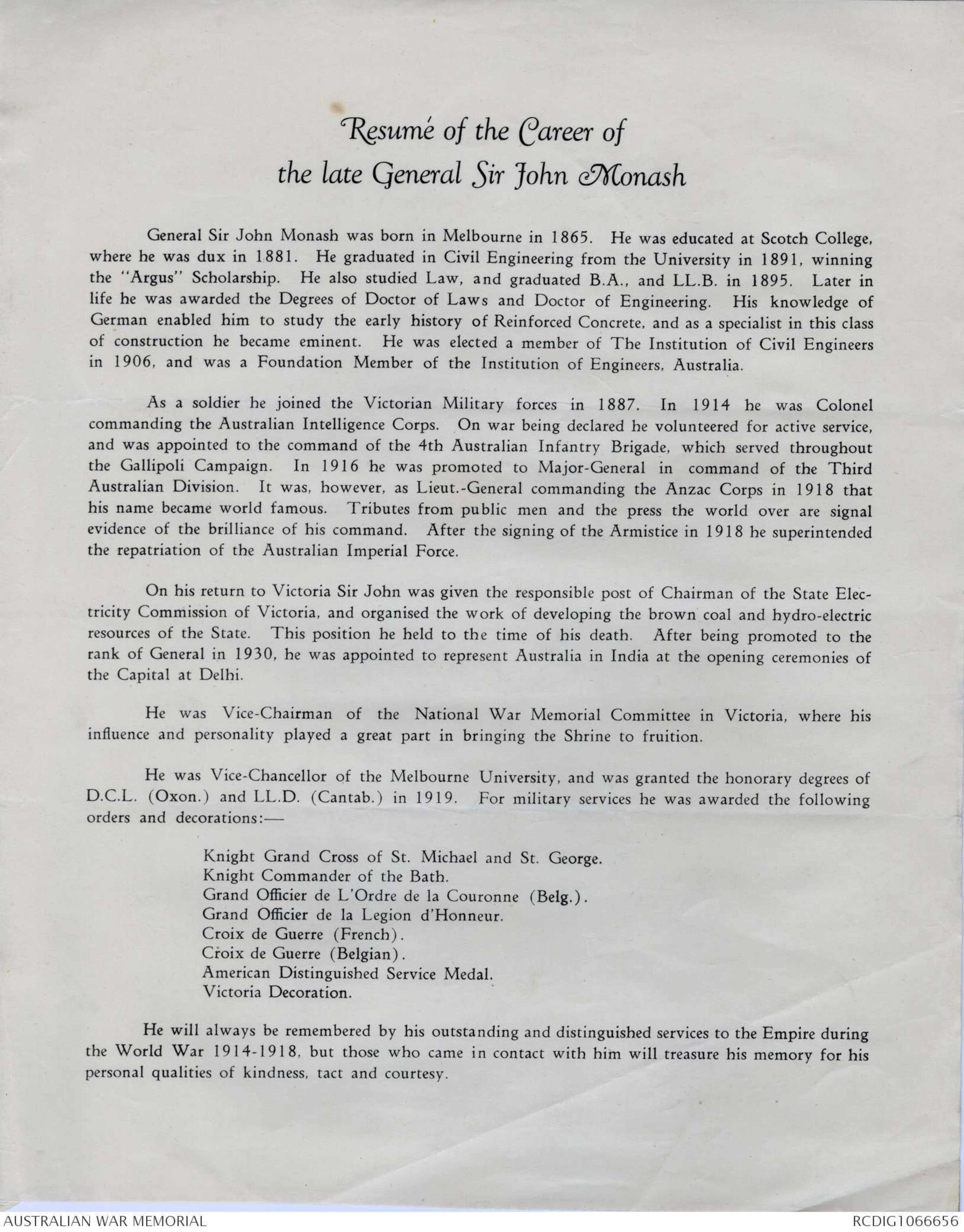
324 LORD MILNER AND THE UNIFIED COMMAND.
Milner* himself rather resented the idea that his responsibilities during the great
German offensive began and ended with the attainment of the unified command.
On 20th April, less than a month after the Doullens Conference, he ceased to be a
member of the War Cabinet and was sworn in as Secretary for War. From then to
the Armistice, in the words of General Smuts (no incompetent judge of such matters),
"his consummate handling of the War Office was undoubtedly one of the factors
which contributed materially to the Allied victory.” But great and many-sided as
were his services in this capacity, and especially those he rendered during the four
long months when, from April to the end of July, the fortune of the Allies remained
upon the razor-edge of fate, this three days’ visit to France, with its ceaseless energy
and unhesitating action, stands pre-eminent as an example no less of Milner’s
self-effacing patriotism, than of his high and courageous statesmanship. In it he took
upon himself a burden of responsibility than which none heavier was borne by any
man in the World War. For the second and final document, to which he and
Clemenceau (at his bidding) set their hands in the Mairie of Doullens, placed not only
the French and British but the Belgian, American and Italian troops on the Western
Front under the control of Foch. He believed that he could rely upon the support of
Lloyd George and the War Cabinet ; and in the event he was right. His action was
approved at once in London, and the proceedings at Doullens were ratified formally
eight days later at Beauvais by the representatives of all the Powers concerned.
The wisdom of his choice of Foch as generalissimo was speedily, and amply, proved.
But if his action had been questioned or repudiated, he would have had no delegated
powers, no official instructions, to justify it. Of specific authority he had none.
His only instructions were Lloyd George’s words over the telephone. With a standing
so insecure, a statesman mindful of his reputation might well have refused to commit
himself to any hasty decision. The near realities of shell-torn roads, shrivelled
trees, and riven walls might well have numbed the brain of a less prudent agent,
and robbed it of the power to register the sharp decisions which armed Milner to accept
personal responsibility then and there for a fundamental change of command, the
issue of which no man could foresee with any certainty.
Nor does it detract from the merit of his service to recall that all military
authorities, French, British and American, had attributed for two years past the
failure of the Allied arms chiefly to the want of unity of command upon the Western
Front. The fact remains that Milner did what other men had sought to do, and found
impossible ; and did it with such swift decision that even at this eleventh hour it was
still in time. For, on that same day, before the destroyer detailed to carry Milner
back across the Channel had cleared the harbour of Boulogne, Foch was bringing up
the French divisions which stayed the German advance on Amiens by a margin not
of days, but of hours. In the fire of instant peril all concerned were malleable to
the hammer-stroke of Milner’s will. Foch and Clemenceau were reconciled. Haig
accepted the change with alacrity ; and Pétain stood aside to let Foch step to the
front. This at Doullens on Tuesday, 26th March. But a fortnight, a week, even a
few days later. . . . .? If the enemy had struck no paralyzing blow meantime, who
can say that the old dissensions, the endless balancing of political loss against military
gain in the councils of the Allies, the national and personal rivalries in the field, would
not have revived ; that the one golden moment of opportunity would not have passed,
never to return ?
*Lord Milner died—unexpectedly and after a short illness - of encephalitis lethargica on 13th May, 1925, in his
71st year.
Le général Foch
est chargé par les gouvernements
britanniques et français de
coordonner l’action des armées
alliées sur
le front ouest. . Il s’entendra
à cet effet avec les
généraux en chef, qui sont
invités a lui fournir tous les
renseignements nécessaires
Doullens le 26 Mon 1917
Clemenceau Milner
The Times Photo.
THE DOULLENS AGREEMENT,
SIGNED BY M. CLEMENCEAU AND LORD MILNER.
Docts of Record.
THE NEW STATESMAN
Special Supplement
VoL. XVII. No. 419. SATURDAY, APRIL 23, 1921. ADDITIONAL PAGES
THE
ESTABLISHMENT OF “UNITY OF COMMAND"
A HISTORIC DOCUMENT
Very gradually the inner history of the war is coming to light. It will probably be many years before the
public is in possession of anything like the full truth concerning even the main political and military episodes
of the struggle. The reasons why information is still withheld are not “reasons of State,” but for the most
part personal reasons. As a Member of Parliament remarked the other day, if all the facts, as recorded in
official documents, are to be made public “ some war reputations will be blown sky-high.” It would indeed be
hardly too much to say that the reputations which would remain unspotted or undiminished would be very few and
far between. Most of the people who are in a position to enlighten the public would doubtless be willing to
publish some part of the truth, but generally there is some other part which they would prefer kept secret, and
thus very naturally arises a sort of official conspiracy of silence which only time will break down.
Meanwhile, the Repingtons and the Peter Wrights and the Filson Youngs give us their inevitably
tendencious and partial “ revelations.” No doubt much of what they tell us is true, but they have their heroes
or their enemies, and they write with so manifest a purpose that it is very difficult for the uninformed reader to be
sure what fraction or aspect of the truth he is really getting.
We print below a document about which such doubts cannot arise. It blasts no reputation, but it reveals
the precise and unchallengeable truth about one of the most crucial events of the war—the final act in the story of
the establishment of “ Unity of Command.” Previous attempts to attain this indispensable condition of victory
had broken down, mainly owing to the active or passive resistance of the French and British Commanders-in-Chief,
supported by certain politicians and military theorists in London and Paris. The great disaster of March 21st,
1918, however, and the apprehensions which it aroused, broke down all such obstacles. On arriving in France
Lord Milner found his task, as he describes, unexpectedly easy, and before he had left French soil on the day
of the decision, Foch was moving up the troops which, by a margin of hours, saved Amiens.
MEMORANDUM
TO THE CABINET BY LORD MILNER ON HIS
VISIT TO FRANCE, INCLUDING THE CONFERENCE
AT DOULLENS, MARCH 26TH, 1918.
The Prime Minister having asked me to run over
to France in order to report to the Cabinet
personally on the position of affairs there,
I left Charing Cross at 12.50 on Sunday, March 24th,
accompanied by Major Shawe, of the Rifle Brigade.
We were delayed some time at Folkestone, the boat
not starting till 4.45, and reached Boulogne about 6.30.
Colonel Amery was waiting at Boulogne with two of
the Versailles motors, and we went straight on to
G.H.Q. at Montreuil. Here I saw General Davidson,
who was just communicating on the telephone with
the C.G.S. when I came in. He gave me a brief sketch
of the situation, which had been developing very rapidly
and adversely during the day. From Montreuil I
was accompanied by Brig.-General Wake, a member
of General Rawlinson’s staff at Versailles, who was
returning to that place after having spent a day and
a half at G.H.Q. On the long journey from Montreuil
to Versailles he was able to give me a very full account
of all that had happened so far as it was yet known.
The great mystery was the breakdown of the Fifth
Army, which so far was not explained. Owing to
this Army being so much broken and communications
cut in all directions, it was difficult to make out exactly
what had happened, and it would take time to place
together the reports. Broadly speaking, however,
there was no doubt that this Army was shattered
and a breach effected in the Allied line between the
right flank of the Third Army and the French. This
did not mean, of course, that there was no more
resistance in that quarter. The retreating troops,
who had now been driven from the line of the Somme
below Peronne, were apparently still fighting at a
number of points and sometimes even counter-attacking,
but were no longer anything like an organised barrier
to the German advance. The rapidity with which this
Army had been driven from its strongly-prepared
positions will no doubt be explained in time. It
does not appear to have been due to any lack of gallant
fighting, and no doubt the German impact at this
point was quite tremendous, the attacking forces
probably outnumbering the defenders by at least
two to one. It was clearly useless to speculate with
our present knowledge about the causes or the exact
course of events in this quarter, but the effect of what
had happened on the general situation was, of course,
perfectly clear and did not need to be dwelt upon.
The journey from Montreuil to Versailles took over
six hours, including a stop of about three-quarters of
ii [SPECIAL SUPPLEMENT.] THE NEW STATESMAN APRIL 23, 1921
an hour at Abbeville, where we had some dinner, and
we did not reach General Rawlinson’s house at
Versailles till 2.30 a.m. A telegram from G.H.Q.,
dated 11.30 p.m., which we found on arrival, stated
that from the latest reports the general situation was
somewhat improved.
I was up at 7 the next morning, March 25th, and
after breakfast I saw Rawlinson. Wake gave us both
a connected account of what had happened during the
time he was at G.H.Q., illustrating it by a large map
which he had brought with him from there. This
was substantially, with some more detail, what I had
learnt from him the previous night. Soon after 9
I had a message from M. Clemenceau, to say that he
urgently wished to see me. I motored into Paris at
once, accompanied by Colonel Amery, and found
Clemenceau at the Ministry of War. He was in great
form and very full of fight, and, while fully realising the
gravity of the situation, showed not the slightest
sign either of despondency or confusion. Our interview
was not long, as he had a number of important matters
to attend to immediately. He told me that he thought
important decisions must be taken at once. His view
was that it was necessary at all costs to maintain the
connection between the French and British Armies,
and that both Haig and Pétain must at once throw
in their reserves to stop the breach which was in course
of being effected.
He said, among other things, it would be necessary
to bring pressure to bear upon Pétain to do more in
that direction. He evidently hoped that Haig would
be able to bring down more reserves from the north.
He was most anxious to go and meet the British and
French Commanders-in-Chief that afternoon, taking
General Foch and me with him. He heard that
General Wilson was arriving at Abbeville to meet
Haig, and he was trying to get them to come on to
Compiègne, Pétain’s headquarters, where we could
join them in the course of the afternoon. He told me
to hold myself in readiness to start at a moment's
notice on a message from him after 2 o’clock.
accordingly returned at once to Versailles, as I was
anxious to see Rawlinson again before leaving and
learn his views of the situation more fully than I had
had time to do in the early morning. While at Versailles
I had a message from Wilson at Abbeville asking me
to meet him there at 3 o clock, but as this message
did not reach me till 12.30, it was evidently impossible
to get to Abbeville by 3. As, moreover, I knew that
Clemenceau was trying to get Haig and Wilson to
come to Compiègne, and as I was in any case pledged
to Clemenceau, I determined not to change my plans.
I accordingly went to the Embassy in Paris at 2,
where I saw Lord Bertie, and waited there until just
before 3 I got a summons from Clemenceau. The
President of the Republic, Clemenceau, who was
accompanied by M. Loucheur, General Foch, and I,
then all motored to Compiègne, arriving a little before 5.
Petain met us there, but it had unfortunately been
impossible, as I had always feared, to get Haig and
Wilson to meet us also. A Conference was held at
Pétain’s headquarters between 5 and 7. The President
of the Republic was in the Chair, the others present
were Clemenceau, Loucheur, Pétain, Foch and I.
Pétain explained very clearly his view of the position.
He took a very pessimistic view of the condition of
the Fifth Army, which, he said, as an army had
ceased to exist and would have to be completely
reorganised. It had now been placed by Haig under
his (Pétain’s) orders. He was, he said, bringing up
from the south and west all the divisions he could
possibly spare to support and replace the débris of the
Fifth Army. Six divisions, which he had always
had in reserve close at hand to reinforce the British
right in case of necessity, were already heavily engaged
in the neighbourhood of Noyon, Roye and Nesle,
and he was bringing round nine more divisions—
mostly from the south but some from the north—which
would be pushed westward to meet the advancing
Germans, from Montdidier and Moreuil. This was all
he could possibly spare at the moment, though he
hoped to bring more presently, but he could not neglect
either the danger of the Germans pushing down the
Oise from about Noyon, nor a threatened attack in
the region of Reims. While not differing from General
Pétain’s strategic plans, General Foch evidently took
a somewhat different view of the situation. He thought
the danger of the great German push to break in between
the French and British in the direction of Amiens
was so formidable that risks must be taken in other
directions. Even more divisions must if possible be
thrown in, and, by a great effort, this might be done
more quickly than Pétain thought possible—even if
the relieving forces were thrown in in less complete
formation than under conditions of less extreme
urgency would be desirable. This at least was my
interpretation of his long and very energetic statement,
all the military details of which it was not possible
for me to follow. Poincaré and Clemenceau were
evidently in sympathy with Foch’s view of the necessity
of taking extreme measures with all possible rapidity,
and the latter now appealed to me to express my opinion
and especially to say what more I thought the British
on their side could do, in order to re-establish the
complete co-operation of the two Armies. I replied
that, of course, it was impossible not to agree in principle
with the views expressed, but that it would not be
justifiable for me to give an opinion as to the exact
course to be followed without having been able to
consult Haig and Wilson. It was most unfortunate,
though it could not be helped, that they were not
present, but I thought we must try to remedy this
at the earliest possible moment and have another
meeting, at which one or, if possible, both of them should
be present, next day. Clemenceau, agreed with this,
and it was accordingly decided that we should try to
arrange a meeting at Dury, just south of Amiens,
at 11 o’clock on the following morning, to which all
those present should come to meet the British generals.
Poincaré, Clemenceau, Loucheur, Foch and I then
returned to Paris, but before leaving Compiègne I had
a few minutes’ private conversation with Clemenceau,
in which I impressed upon him that, to the best of
my belief, the British Third Army, which seemed to
have stood magnificently together with the reliefs
which were being sent to it from the north, were already
doing all they could, and that I had some misgiving
whether Pétain on his side was prepared to take sufficient
risks in order to bring up all possible French
reserves, on which, as it seemed to me, everything
depended. He said that he agreed, but that Pétain
was already doing much more than he had originally
contemplated, and would, he believed, do more still.
He also agreed with me in sympathising with the
attitude of Foch.
I got back to Versailles at 9 o’clock and was very
happy to find that Wilson had just arrived from
Abbeville. Meanwhile, a message had arrived from
APRIL 23, 1921 THE NEW STATESMAN SPECIAL SUPPLEMENT. iii
Haig to say that he wished the meeting next morning to
be at Doullens, as he had to be there in any case to meet
his th ee Army Commanders, Horne, Byng and Plumer,
and that he desired it should be at 12 o’clock. This
was arranged by telephone with Paris. I had some
conversation with Wilson, who reported what had
passed between him and Haig. Everybody seemed to
be agreed now that the object of the Germans was
to push hard for Amiens through the gap south of the
Somme, at the same time directing an attack pointing
north-west against the English and south-west against
the French, so as to widen the breach between them.
Our object must be by all means in our power to keep
touch with the French and fill up the gap, while of
course resisting these attacks. The greatest promptitude
in bringing up reserves and complete co-operation
between the Armies was necessary. We discussed
the personal difficulties of effecting such co-operation,
and Wilson made the suggestion—which seemed a
good one—that both countries might agree to leave it
to Clemenceau, in whom the British generals as well
as the French had confidence, to take any decisions
necessary to bring about the better co-operation of the
Armies and the best use of all available reserves. He
was on the spot. His country was at stake, and he
would no doubt be guided by the military opinion of
Foch, who appeared the most likely man to take bold
and prompt decisions, and to see the struggle as a
whole without taking a specially French view.
Late that night Wilson motored into Paris to see
Foch, but he had not returned when I went to bed
about midnight.
I was up at 7 on Tuesday, the 26th, and at 8 Wilson
and I started for Doullens in a motor, followed by Lord
Duncannon and Major Shawe. We were very anxious
lest the roads should be congested by military traffic
and possibly by refugees, but fortunately, though the
military traffic was very heavy, it was also very orderly
and there was no sign of panic among the population,
so that, with a few blocks, we got along well, nearly
40 miles an hour on the average, and were at Doullens
only five minutes after the appointed hour—12 o’clock.
An extremely lucky journey, seeing the distance and
the conditions. On the way we discussed very earnestly
the problem before us and the best way of pulling things
together, which Wilson strongly thought could only
be attained by putting the supreme direction virtually
in the hands of Foch. I asked Wilson what Foch
had said to his idea of making Clemenceau nominally
the “ generalissimo" with Foch to advise him. He
said that Foch had objected to this on the ground
that Clemenceau, placed in that position, might be
drawn in opposite directions by Pétain and himself,
and if he agreed now with one and now with the other,
there would be no unity of control. Foch himself did
not wish to command anything. All he wanted was
to have the express authority of the two Governments
to bring about the maximum co-operation between
the two Commanders-in-Chief. He wanted, in fact,
the same kind of position which he had held once
before, at the time of the battle of Ypres, when Field-
Marshal Joffre delegated him to try and get the British
and French to work more closely together—only he
now wanted to be placed in that position with a more
distinct and higher authorisation, that of both the
Allied Governments. Wilson and I agreed that if
we could possibly get this accepted, it was, under the
circumstances, the best solution. It was, in fact
something like a return to the original idea of the
Council at Versailles directing a general reserve, with
Foch in the chair, only with the substitution of a
single man for the Council, which appeared better in
any case, and absolutely vital under the extremely
urgent circumstances of the moment. There was also
this in favour of it—that we knew that the British
reserves had already been put in, or were on their way
to be put in, and that the real question now was how
much in the way of reserves could be got out of the
French, and how quickly it could be got. From what
General Wilson had often told me, and from what I
had seen myself the previous day, I was convinced
that, whatever might be his other merits or demerits
as a soldier, Foch possessed in a quite exceptional
degree the promptitude, energy and resource necessary
to get the most done in the time available, the whole
question being evidently a race for time.
On arrival at Doullens I was at once seized by
Clemenceau, who startled me by the announcement
that Haig had just declared that he would be obliged
to uncover Amiens and fall back on the Channel ports.
I told him I felt sure there must be some misunderstanding
about this, and that before the general
Conference I thought it was desirable that I should
have a short conversation with the Field-Marshal and
the Army Commanders, whom I had not yet seen.
To this he readily agreed. I accordingly had a little
consultation with Haig, Plumer, Horne and Byng.
They all bore themselves splendidly, showing coolness,
resolution and high courage. I was especially struck
by the attitude of General Byng, who, commanding
the Third Army, had had to bear the greatest and
indeed an almost unendurable strain. As I quite
expected, it turned out that the Field-Marshal’s view
about Amiens had been misunderstood. He had no
doubt in his mind as to the supreme importance of
Amiens, nor any intention of abandoning it. All he
had meant to say was that, as the forces at his disposal,
even after he had skinned the northern part of his
line to the utmost extent, would not enable him to
hold further than to Bray-sur-Somme, he would in
fact be outflanked and unable to cover Amiens, unless
the French came up to his assistance south of the
Somme on the right. Even then it was uncertain
whether, with a big German attack impending against
the Third Army south of Arras, his line would not be
broken, but at any rate he was fully determined to
stand his ground as long as he could, and, with some
assistance from the French on his right flank, he believed
he ought to be able to do so. Byng was also strongly
in favour of the British line making every effort to
stand where it now did, extending to Bray-sur-Somme,
and believed that, though his troops, which had had
tremendous fighting, were very tired, they would not
be beaten. It was evident that everything was being
done by bringing divisions from further north to
strengthen the line between Arras and the Somme.
I next had a few words with the Field-Marshal alone
about Foch, and was delighted to find that, so far
from resenting—as I had been led to believe he might
do—the thought of Foch’s interference, he rather
welcomed the idea of working with the latter, about
whom his tone was altogether friendly.
The views of the British Commanders having thus
been cleared up, the Conference assembled. As on
the day before, M. Poincaré was in the chair. The
others present were Clemenceau, Loucheur, Foch,
Pétain, Haig, Wilson and I. It was at once agreed
that every effort should be made to save Amiens.
iv [SPECIAL SUPPLEMENT] THE NEW STATESMAN APRIL 23. 1921
The idea that Haig was thinking of abandoning this
and falling back on the northern ports was cleared
away, and it was made quite evident that he was bringing
up every division he could possibly spare, and even
running some risks on the northern portion of his line
in order to strengthen the position from just north
of Arras to the Somme, where the most tremendous
push was threatened. He could do no more. What
could the French do? Pétain then explained his
difficulties and the great efforts he was making. He
had now, however—probably under pressure from
Clemenceau, but of this I cannot be sure—advanced
so far from his position of the previous day, that he
saw his way to bringing up 24 divisions instead of 15,
though it would of course take a longer time and did
not mean 24 entirely fresh divisions, as the first six
or nine (his original reserve and one or two more)
had already been heavily engaged for some days in
the Noyon-Roye region. But while he was thus
evidently under the pressure of circumstances becoming
steadily more ready to take risks and assume heavy
responsibilities, he was still rather discouraging (perhaps
rather more than he meant to be) about the pace at
which the divisions could come up, and generally gave
a certain impression of coldness and caution, as of a
man playing for safety. None of his listeners seemed
very happy or convinced. Wilson and Haig evidently
were not, indeed, Wilson made an interjection which
almost amounted to a protest. Foch, who had been
so eloquent the day before, said not a word. But,
looking at his face—he sat just opposite me—I could
see that he was still dissatisfied, very impatient, and
evidently thinking that things could and must be done
more quickly. At this juncture I asked whether I
might have a word with Clemenceau alone. I then
told him quite frankly of the conviction which had
been growing in my mind ever since the previous day,
and had been confirmed by my conversations with
Wilson and Haig, that Foch appeared to me to be
the man who had the greatest grasp of the situation,
and was most likely to deal with it with the intensest
energy. Could not he be placed by both the Governments
in a position of general control, and given the sort
of authority which he (Foch) had himself suggested
to Wilson ? Clemenceau, whose own mind, I am sure,
had been steadily moving in the same direction, at
once agreed, but he asked for a few minutes to speak
to Pétain. While he took Pétain aside, I did the same
with Haig. When I explained to the latter what was
contemplated, he seemed not only quite willing but
really pleased. Meanwhile Clemenceau had spoken to
Pétain, and immediately wrote and handed me the
following form of words, to embody what he and I
had just agreed to :
Le général Foch est chargé par les gouvernements britanniques
et français de coordonner l’action des armées britanniques et
françaises sur le front ouest. Il s’entendra à cet effet avec
les deux généraux en chef, qui sont invités à lui fournir tous
les renseignements nécessaires.
I showed this to Haig, who readily accepted it, but
suggested that it should be extended to cover the
other armies—Belgian, American and possibly Italian
—that might be employed on the present Franco¬
British front. To this Clemenceau at once agreed.
We then all went back to the table. The amended
formula, which ran as follows,
Le général Foch est chargé par les gouvernements britanniques|
et français de coordonner l’action des armées alliées sur le front
ouest. Il s’entendra à cet effet avec les généraux en chef, qui
sont invités a lui fournir tous les renseignements nécessaires.
Doullens, le 26 mars, 1918.
was read out, and after a very short discussion, which
amounted to nothing more than cordial approval of
the principle by all the speakers, the document was
signed by Clemenceau and myself, and the Conference
immediately rose with every appearance of general
satisfaction. Poincare, Clemenceau, and Loucheur were
all delighted, and Haig, I was glad to see, also looked
distinctly relieved and much happier than he had
seemed earlier in the morning. I did not particularly
notice Pétain’s attitude, nor did I hear him say anything,
but he is always exceedingly cool and self-possessed
and never in word or expression betrays his real feelings.
I gathered, however, from Clemenceau that Pétain
had fallen into the arrangement without difficulty.
Within a few minutes of the end of the Conference
everybody had dispersed. Wilson had a few words
with Lawrence before Haig and Lawrence left, and
afterwards told me that the latter was exceedingly
pleased with the conclusion arrived at. Wilson and I,
with our two companions, had a late lunch at Doullens
after the Conference was over, and then motored to
Boulogne. On the way we stopped at Haig’s house
near Montreuil (his G.H.Q.) to pick up the latest news,
and met the Field-Marshal just going out for a ride.
He certainly looked much less tired and in much better
spirits than he had done earlier in the day. He told
me again that he felt sure the new arrangement would
work, as he would have to do with “a man and not a
committee.” He also had a few minutes' conversation
with Wilson, to whom, as I was informed by the latter,
he expressed himself as very well pleased indeed with
the day’s proceedings.
Wilson, Duncannon, Shawe and I reached Boulogne
just before 7. A destroyer was waiting to take us
to Folkestone, where we landed at 9, and arrived at
Victoria shortly after 11.
(Initialled) M.
2 Whitehall Gardens, S.W. 27th March, 1918.
Printed for the Proprietors by W. SPEAIGHT & SONS. Ltd., 98 & 99 Feter Lane, E.C. 4 ; Published by the STATESMAN PUBLISHING Co., LTD.,10. Great Queen Street,
Kingsway, W.C. 2.—April 23, 1921.
Milne's words re
State of Fifth Army
"The great mystery ws / breakdown o /
Fifth A., wh had not so far been explained.... Broadly
speaking, however, there ws no doubt tt this army
ws shattered"
VOL. X—60
was ordered to work round the left of the enemy so as to
harass the defence, but the main attack was directed against
their right flank. The advance was resumed in this order,
the German prisoner being forced to march in front. Almost
at the outset, however, Bowen was shot by a sniper from
the scrub. Buller rendered first aid, and carried his commanding
officer, who was seriously wounded, into the shade
at the side of the road. Hill took over the command and
continued to attack the trench, making gradual progress.
Meanwhile he sent back Buller to bring up the reinforcements
expected from the Berrima; these Buller met about a mile
back, at noon.
When Elwell commenced his advance from Kabakaul, the
day was windless and hot—so hot that his men on landing
emptied rations, blankets, and clothing out of their haversacks
to lighten the load. As they formed up, Elwell took command
and went on with the right half-company, Gillam following
with the left half in support. Gunner Yeo, to whom Buller
had passed on Bowen’s message for reinforcements, guided
them to the Bitapaka road. About a mile from the shore
they were fired on, either by one of the patrols sent out by
Wuchert earlier in the morning, or by a detachment from
Mayer’s company at Takubar. Elwell, who knew nothing of
the location of Bowen’s party except that it must be fighting
somewhere ahead of him, thereupon decided to send scouts
into the bush on each side, and to proceed quickly with his
main body along the road in fours, since reports were coming
from the connecting files left by Hill that Bowen was hard
pressed. The dust of a long drought was deep under their
feet, and rose in fine clouds, choking their nostrils and filling
their eyes; but the reinforcements pushed eagerly on. Inasmuch
as those who were forcing their way through close,
matted jungle and undergrowth could not keep up with men
advancing on the highway, patrols of six men at a time were
sent along the road ahead of the company; from these fresh
scouts deployed as the others were overtaken, and the men
left behind fell in and formed a rearguard under Signal-
boatswain Hunter.24 The reinforcements had advanced in
24 Lieut. W. D. Hunter; R.A.N. Of Surrey Hills, Vic.; b. Melbourne, 1 Dec.,
1887.
Melbourne "Argus"
1931. 14/10/31
SIR JOHN MONASH
LEGACY CLUB TRIBUTE.
Address by Sir Brundenell White.
Tributes to Sir John Monash, who was
a patron of the Legacy Club, were paid at
the weekly luncheon of the club yesterday,
when Major-General Sir Brundenell White
delivered an address on the work of Sir
John Monash. In addition to the
patron of the club (General Sir Harry
Chauvel) and private guests of members
there were present many official
guests of the club, representing organisations
with which Sir John Monash had
been associated. The official guests were
the Lord Mayor (Councillor Luxton,
M.L.A.). Rear-Admiral W. Munro Kerr
(representing the Navy), Colonel J.D.
Lavarack (representing the Army),
Air-Commodore R. Williams (representing the Air
Board). Mr. W.S. Littlejohn (representing
the University Council) and Scotch College).
the chief commissioner of police
(Major-General T. A. Blamey), the Federal
president of the Returned Soldiers' League
(Mr. G.J.C. Dyett), and the president
of the Victorian branch of the league (Mr.
G.W. Holland), Vice-Admiral Sir William
Creswell (representing the Naval and Military
Club), the chairmen of the Repatriation
Commission (Colonel J.M. Semmens),
the chief engineer of the State Electricity
Commission (Mr. H.R. Harper), Mr. M.M.
Phillips (representing the Rotary Club),
and Dr. Gershon Bennett, Sir John Monash's
son-in-law. The president of the club
(Mr. Rex Hall) presided.
Sir Brudenell White said that in the
death of Sir John Monash the Legacy Club
had left the nation a great legacy of example, and
the Legacy Club should be among the chief
beneficiaries. It would not be inappropriate
if the Legacy Club were to add to its creed
another vow - a vow to ensure that the
youth of Australia understood and accepted
as a beacon to guide it to high endeavour,
the record of service left by Sir
John Monash. The special personal qualities
upon which the achievements of great
men were founded were often sought after
their passing. Sometimes their success was
attributed to ambition, and sometimes' to
unusual mental endowment. In neither of
these driving forces, he felt certain, lay the
secret of Sir John Monash's extraordinary
life. The outstanding quality of Sir John
Monash's character had been great simplicity
"If Sir John Monash had been asked
what in his daily experiences," Sir
Brudenell White continued, “gave him the
most pleasure, he would probably have replied,
not the plaudits of his country, not
rewards for his services, nor honours for
his achievements, but the welcome which
he received at home each night from a
grandchild. Sir John Monash undoubtedly
possessed mental capacity far above the
ordinary, and he possessed, moreover, the
capacity to apply his special gifts in the
best possible way, but far more important
than those endowments were his simplicity,
his integrity, and his even mindedness.
Empty ambition meant nothing to him. His
ambition was the greater one, to do thoroughly
everything which he was called upon
to do, and no work was too hard for him,
or no trouble over detail too great if it
meant the achievement of his object. That
was why he gained such distinction in the
war.
"It might be asked, in view of the great
capacity which Sir John Monash showed
as a war leader, whether someone did not
err- because his promotion was so long
delayed. I should remind you that, even
from his University days, Sir John Monash
had a great intellectual rival in the late
Sir James McCay. It was perhaps singular
that Sir James McCay left Australia with
the Second Brigade, while Sir John Monash
followed him with the Fourth Brigade.
Looking back, I doubt whether the command
of a brigade was Sir John Monash's
proper sphere. He performed his duties to
perfection, but he lacked the opportunity to
show the special skill with which he was
endowed. When he was appointed to form
the Third Australian Division he performed
this task in a manner which gained admiration
from all his seniors. It was thus
natural that when the time came to appoint
a Dominion officer to replace Sir William
Birdwood in command of the Australian
troops, the choice should have fallen upon
Sir John Monash as the best equipped of
five very able divisional commanders."
Resumé of the Career of
the late General Sir John Monash
General Sir John Monash was born in Melbourne in 1865. He was educated at Scotch College,
where he was dux in 1881. He graduated in Civil Engineering from the University in 1891, winning
the “Argus” Scholarship. He also studied Law, and graduated B.A., and LL.B. in 1895. Later in
life he was awarded the Degrees of Doctor of Laws and Doctor of Engineering. His knowledge of
German enabled him to study the early history of Reinforced Concrete, and as a specialist in this class
of construction he became eminent. He was elected a member of The Institution of Civil Engineers
in 1906, and was a Foundation Member of the Institution of Engineers, Australia.
As a soldier he joined the Victorian Military forces in 1887. In 1914 he was Colonel
commanding the Australian Intelligence Corps. On war being declared he volunteered for active service,
and was appointed to the command of the 4th Australian Infantry Brigade, which served throughout
the Gallipoli Campaign. In 1916 he was promoted to Major-General in command of the Third
Australian Division. It was, however, as Lieut.-General commanding the Anzac Corps in 1918 that
his name became world famous. Tributes from public men and the press the world over are signal
evidence of the brilliance of his command. After the signing of the Armistice in 1918 he superintended
the repatriation of the Australian Imperial Force.
On his return to Victoria Sir John was given the responsible post of Chairman of the State
Electricity Commission of Victoria, and organised the work of developing the brown coal and hydro-electric
resources of the State. This position he held to the time of his death. After being promoted to the
rank of General in 1930, he was appointed to represent Australia in India at the opening ceremonies of
the Capital at Delhi.
He was Vice-Chairman of the National War Memorial Committee in Victoria, where his
influence and personality played a great part in bringing the Shrine to fruition.
He was Vice-Chancellor of the Melbourne University, and was granted the honorary degrees of
D.C.L. (Oxon.) and LL.D. (Cantab.) in 1919. For military services he was awarded the following
orders and decorations: -
Knight Grand Cross of St. Michael and St. George.
Knight Commander of the Bath.
Grand Officier de L’Ordre de la Couronne (Belg.).
Grand Officier de la Legion d’Honneur.
Croix de Guerre (French)
Croix de Guerre (Belgian)
American Distinguished Service Medal.
Victoria Decoration.
He will always be remembered by his outstanding and distinguished services to the Empire during
the World War 1914-1918, but those who came in contact with him will treasure his memory for his
personal qualities of kindness, tact and courtesy
 Sam scott
Sam scottThis transcription item is now locked to you for editing. To release the lock either Save your changes or Cancel.
This lock will be automatically released after 60 minutes of inactivity.